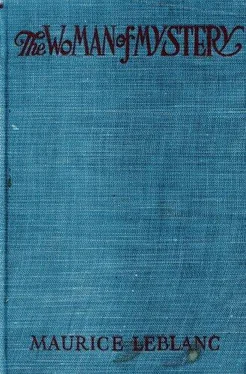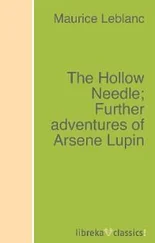Maurice Leblanc - The Woman of Mystery
Здесь есть возможность читать онлайн «Maurice Leblanc - The Woman of Mystery» весь текст электронной книги совершенно бесплатно (целиком полную версию без сокращений). В некоторых случаях можно слушать аудио, скачать через торрент в формате fb2 и присутствует краткое содержание. Жанр: Классический детектив, на английском языке. Описание произведения, (предисловие) а так же отзывы посетителей доступны на портале библиотеки ЛибКат.
- Название:The Woman of Mystery
- Автор:
- Жанр:
- Год:неизвестен
- ISBN:нет данных
- Рейтинг книги:5 / 5. Голосов: 1
-
Избранное:Добавить в избранное
- Отзывы:
-
Ваша оценка:
- 100
- 1
- 2
- 3
- 4
- 5
The Woman of Mystery: краткое содержание, описание и аннотация
Предлагаем к чтению аннотацию, описание, краткое содержание или предисловие (зависит от того, что написал сам автор книги «The Woman of Mystery»). Если вы не нашли необходимую информацию о книге — напишите в комментариях, мы постараемся отыскать её.
The Woman of Mystery — читать онлайн бесплатно полную книгу (весь текст) целиком
Ниже представлен текст книги, разбитый по страницам. Система сохранения места последней прочитанной страницы, позволяет с удобством читать онлайн бесплатно книгу «The Woman of Mystery», без необходимости каждый раз заново искать на чём Вы остановились. Поставьте закладку, и сможете в любой момент перейти на страницу, на которой закончили чтение.
Интервал:
Закладка:
"I saw more of her than it seems humanly possible to see," exclaimed Paul, loudly. "From the moment of the murder her image never left my sight. I have tried to shake it off at times, as one tries to shake off a nightmare; but I could not. And the image is there, hanging on the wall. As sure as I live, it is there; I know it as I should know your image after twenty years. It is she… why, look, on her breast, that brooch set in a gold snake!… a cameo, as I told you, and the snake's eyes… two rubies!… and the black lace scarf around the shoulders! It's she, I tell you, it's the woman I saw!"
A growing rage excited him to frenzy; and he shook his fist at the portrait of Hermine d'Andeville.
"Hush!" cried Elisabeth, under the torment of his[Pg 41] words. "Hold your tongue! I won't allow you to…"
She tried to put her hand on his mouth to compel him to silence. But Paul made a movement of repulsion, as though he were shrinking from his wife's touch; and the movement was so abrupt and so instinctive that she fell to the ground sobbing while he, incensed, exasperated by his sorrow and hatred, impelled by a sort of terrified hallucination that drove him back to the door, shouted:
"Look at her! Look at her wicked mouth, her pitiless eyes! She is thinking of the murder!… I see her, I see her!… She goes up to my father… she leads him away… she raises her arm… and she kills him!… Oh, the wretched, monstrous woman!…"
He rushed from the room.
Paul spent the night in the park, running like a madman wherever the dark paths led him, or flinging himself, when tired out, on the grass and weeping, weeping endlessly.
Paul Delroze had known no suffering save from his memory of the murder, a chastened suffering which, nevertheless, at certain periods became acute until it smarted like a fresh wound. This time the pain was so great and so unexpected that, notwithstanding his usual self-mastery and his well-balanced mind, he utterly lost his head. His thoughts, his actions, his attitudes, the words which he yelled into[Pg 42] the darkness were those of a man who has parted with his self-control.
One thought and one alone kept returning to his seething brain, in which his ideas and impressions whirled like leaves in the wind; one terrible thought:
"I know the woman who killed my father; and that woman's daughter is the woman whom I love."
Did he still love her? No doubt, he was desperately mourning a happiness which he knew to be shattered; but did he still love Elisabeth? Could he love Hermine d'Andeville's daughter?
When he went indoors at daybreak and passed Elisabeth's room, his heart beat no faster than before. His hatred of the murderess destroyed all else that might stir within him: love, affection, longing, or even the merest human pity.
The torpor into which he sank for a few hours relaxed his nerves a little, but did not change his mental attitude. Perhaps, on the contrary, and without even thinking about it, he was still more unwilling than before to meet Elisabeth. And yet he wanted to know, to ascertain, to gather all the essential particulars and to make quite certain before taking the resolve that would decide the great tragedy of his life in one way or another.
Above all, he must question Jerome and his wife, whose evidence was of no small value, owing to the fact that they had known the Comtesse d'Andeville. Certain matters concerning the dates, for instance, might be cleared up forthwith.
[Pg 43]He found them in their lodge, both of them greatly excited, Jerome with a newspaper in his hand and Rosalie making gestures of dismay.
"It's settled, sir," cried Jerome. "You can be sure of it: it's coming!"
"What?" asked Paul.
"Mobilization, sir, the call to arms. You'll see it does. I saw some gendarmes, friends of mine, and they told me. The posters are ready."
Paul remarked, absent-mindedly:
"The posters are always ready."
"Yes, but they're going to stick them up at once, you'll see, sir. Just look at the paper. Those swine-you'll forgive me, sir, but it's the only word for them-those swine want war. Austria would be willing to negotiate, but in the meantime the others have been mobilizing for several days. Proof is, they won't let you cross into their country any more. And worse: yesterday they destroyed a French railway station, not far from here, and pulled up the rails. Read it for yourself, sir!"
Paul skimmed through the stop-press telegrams, but, though he saw that they were serious, war seemed to him such an unlikely thing that he did not pay much attention to them.
"It'll be settled all right," he said. "That's just their way of talking, with their hand on the sword-hilt; but I can't believe…"
"You're wrong, sir," Rosalie muttered.
He no longer listened, thinking only of the trag[Pg 44]edy of his fate and casting about for the best means of obtaining the necessary replies from Jerome. But he was not able to contain himself any longer and he broached the subject frankly:
"I daresay you know, Jerome, that madame and I have been to the Comtesse d'Andeville's room."
The statement produced an extraordinary effect upon the keeper and his wife, as though it had been a sacrilege to enter that room so long kept locked, the mistress' room, as they called it among themselves.
"You don't mean that, sir!" Rosalie blurted out.
And Jerome added:
"No, of course not, for I sent the only key of the padlock, a safety-key it was, to Monsieur le Comte."
"He gave it us yesterday morning," said Paul.
And, without troubling further about their amazement, he proceeded straightaway to put his questions:
"There is a portrait of the Comtesse d'Andeville between the two windows. When was it hung there?"
Jerome did not reply at once. He thought for a moment, looked at his wife, and then said:
"Why, that's easily answered. It was when Monsieur le Comte sent all his furniture to the house… before they moved in."
"When was that?"
Paul's agony was unendurable during the three or four seconds before the reply.
"Well?" he asked.
[Pg 45]When the reply came at last it was decisive:
"Well, it was in the spring of 1898."
"Eighteen hundred and ninety-eight!"
Paul repeated the words in a dull voice: 1898 was the year of his father's murder!
Without stopping to reflect, with the coolness of an examining magistrate who does not swerve from the line which he has laid out, he asked:
"So the Comte and Comtesse d'Andeville arrived…"
"Monsieur le Comte and Madame le Comtesse arrived at the castle on the 28th of August, 1898, and left for the south on the 24th of October."
Paul now knew the truth, for his father was murdered on the 19th of September. And all the circumstances which depended on that truth, which explained it in its main details or which proceeded from it at once appeared to him. He remembered that his father was on friendly terms with the Comte d'Andeville. He said to himself that his father, in the course of his journey in Alsace, must have learnt that his friend d'Andeville was living in Lorraine and must have contemplated paying him a surprise visit. He reckoned up the distance between Ornequin and Strasburg, a distance which corresponded with the time spent in the train. And he asked:
"How far is this from the frontier?"
"Three miles and three-quarters, sir."
"On the other side, at no great distance, there's a little German town, is there not?"
[Pg 46]"Yes, sir, Ebrecourt."
"Is there a short-cut to the frontier?"
"Yes, sir, for about half-way: a path at the other end of the park."
"Through the woods?"
"Through Monsieur le Comte's woods."
"And in those woods…"
To acquire total, absolute certainty, that certainty which comes not from an interpretation of the facts but from the facts themselves, which would stand out visible and palpable, all that he had to do was to put the last question: in those woods was not there a little chapel in the middle of a glade? Paul Delroze did not put the question. Perhaps he thought it too precise, perhaps he feared lest it should induce the gamekeeper to entertain thoughts and comparisons which the nature of the conversation was already sufficient to warrant. He merely asked:
Читать дальшеИнтервал:
Закладка:
Похожие книги на «The Woman of Mystery»
Представляем Вашему вниманию похожие книги на «The Woman of Mystery» списком для выбора. Мы отобрали схожую по названию и смыслу литературу в надежде предоставить читателям больше вариантов отыскать новые, интересные, ещё непрочитанные произведения.
Обсуждение, отзывы о книге «The Woman of Mystery» и просто собственные мнения читателей. Оставьте ваши комментарии, напишите, что Вы думаете о произведении, его смысле или главных героях. Укажите что конкретно понравилось, а что нет, и почему Вы так считаете.












